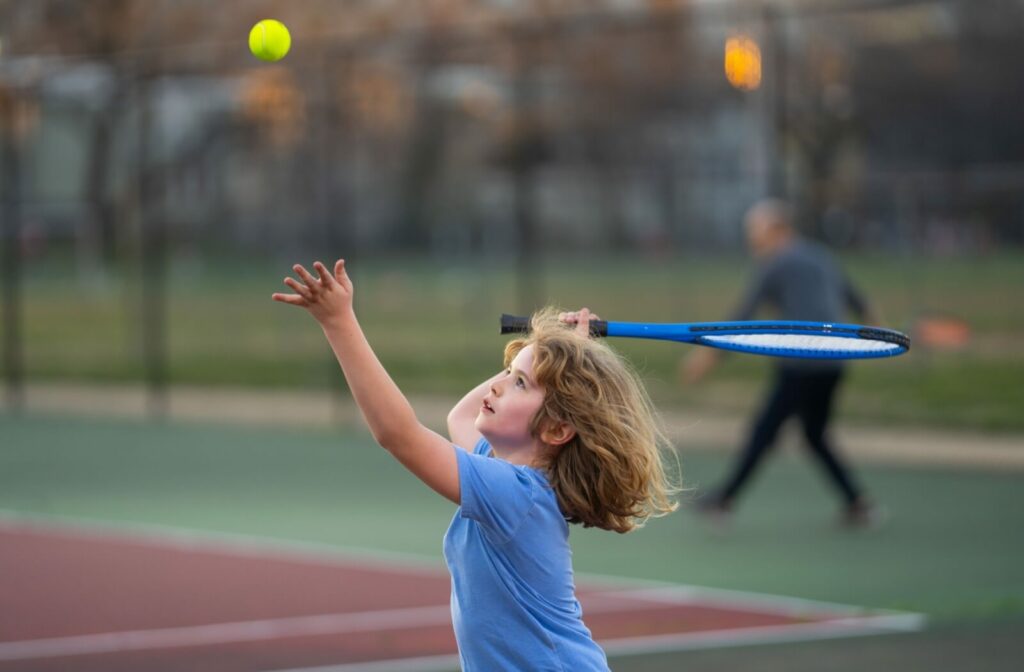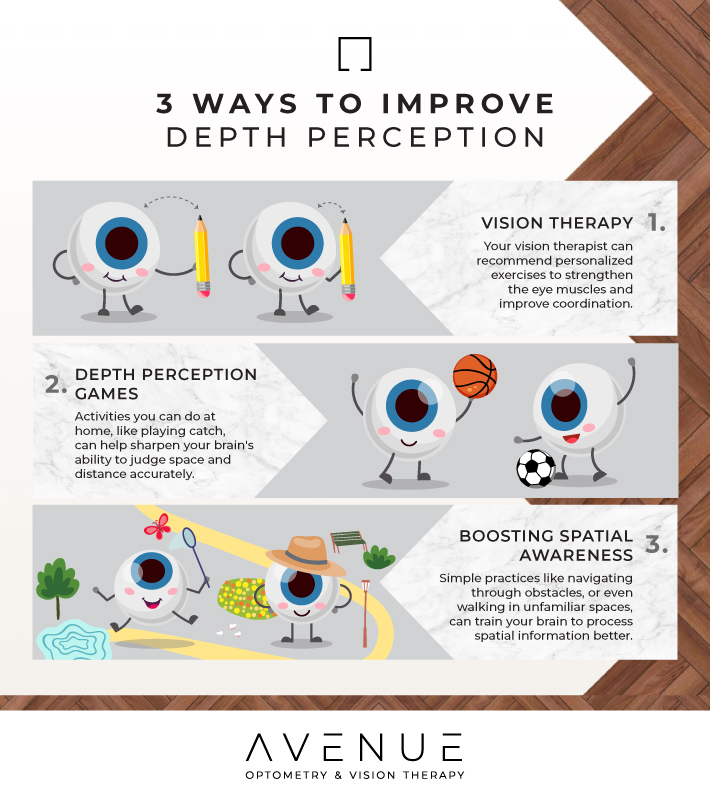Depth perception helps us interact with the world safely and effectively. It allows us to catch a ball, drive a car, and even walk downstairs without tripping. Yet, many take it for granted until things go awry. The good news is that you can improve depth perception and make those daily tasks a little less daunting.
Several exercises and techniques can help improve depth perception, such as focus exercises, activities that require hand-eye coordination, and vision therapy. By honing these skills, you can improve your spatial awareness, making everyday activities safer and more efficient.
Understanding Depth Perception
Depth perception is the ability to perceive the world in 3D and judge the distance between objects. It’s what allows you to thread a needle or park a car in a tight spot.
The Brain-Eye Connection
Your brain and eyes work in tandem to create depth perception. Our eyes capture 2 slightly different images, and the brain merges them to form 1 cohesive view.
The retina in each eye receives an image from the surrounding environment. Your brain processes these images, matching them together to assess distance and spatial relationships. This process, known as binocular vision, is crucial in developing depth perception.
While both eyes contribute, the brain plays a pivotal role in achieving clear, depth-filled vision. If either the eyes or the brain fails to function correctly, it can lead to poor depth perception. Understanding this delicate balance can help identify areas for improvement.
Identifying Depth Perception Issues
How can you tell if you or your child might have an issue with depth perception?
One of the most common indicators is difficulty judging distances, especially noticeable when driving or playing sports. You might also notice your child frequently bumping into things or complaining about not being able to see the board at school.

Challenges with hand-eye coordination tasks, like catching or throwing a ball, may also hint at underlying depth perception problems. Additionally, if tasks requiring precise spatial awareness, like pouring liquids without spilling, become increasingly difficult, it might signal a depth perception issue.
If you suspect you or your child might be experiencing issues with depth perception, your eye doctor can help you get to the bottom of it. Through a detailed eye exam, they can test for visual acuity and depth perception and look for signs of underlying conditions.
Factors Affecting Depth Perception
- Age: Age can affect many things, including depth perception. Young children may not have fully developed depth perception yet, but by age 2, it should be fully developed. On the other hand, older adults may experience a decline due to age-related vision changes.
- Vision impairments: Vision impairments such as strabismus or amblyopia can lead to poor depth perception. These conditions disrupt binocular vision, making it difficult for the brain to merge images correctly.
- Environmental factors: Lighting and contrast can also impact how well we perceive depth, which may be more noticeable during activities like nighttime driving.
- Psychological and neurological factors: Depth perception isn’t solely reliant on the physical aspects of vision. Psychological and neurological factors can also play a part. Conditions like anxiety or neurological disorders can affect how the brain processes visual information, leading to issues with depth perception.
Techniques to Improve Depth Perception
Improving depth perception is achievable at any age with the right strategies. While younger individuals may find it easier due to neuroplasticity, adults can also see significant gains.
By practicing specific eye exercises, engaging in hand-eye coordination activities, and doing visual therapy exercises, nearly anyone can boost their depth perception.
Vision Therapy Exercises
Vision therapy offers a series of exercises to improve binocular vision. These exercises can strengthen the eye muscles and improve coordination, allowing for better depth perception. Regular practice can lead to noticeable improvements over time.
Depth Perception Games
Games designed specifically to develop depth perception can be both fun and beneficial. Activities that require estimating distances or catching moving objects help sharpen your brain’s ability to judge space and distance accurately.
Boosting Spatial Awareness
Improving spatial awareness is another effective way to enhance depth perception. Simple practices like navigating through obstacles or even walking in unfamiliar spaces can train your brain to process spatial information more effectively.

Benefits of Better Depth Perception
Enhancing your depth perception can lead to significant benefits in various aspects of daily life, including:
- Improved safety
- Enhanced athletic performance
- Potential for increased confidence
- Improved independence and quality of life
By consistently working on improving your depth perception, you can enjoy new opportunities and experiences, making the world a more accessible and enjoyable place.
Start Your Path to Better Vision
It’s never too late to improve your depth perception. By exploring techniques and leveraging vision therapy technology, you can overcome issues with depth perception. And if you’re unsure where to start, seeking professional advice is a wise choice.
If you want to improve your depth perception, Avenue Optometry & Vision Therapy is here to help. We offer tailored solutions to address your unique needs. Book an appointment today and take the first step!




